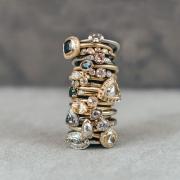Tinnitus is a symptom that causes a person to hear noise in the ear and/or head with no external source. From ringing to remedies, here are 7 things you may not have known about tinnitus...

1. You're not alone
Over 6 million people in the UK are affected by tinnitus - that's 1 in 10 people who experience it at some point in their lives, whether temporarily or permanently. So if you're experiencing it, you're not alone.
2. It's not just ringing
Tinnitus derives from the Latin word for 'ringing'. This explains one of the common sounds heard by people who are experiencing tinnitus, but it is not the only sound. Tinnitus can also be heard as a buzzing, whistling, hissing, roaring, clicking, waving, humming and various other sounds.
3. Tinnitus is a symptom, not a condition
Tinnitus isn't a disease or condition; it's a symptom created in the auditory system caused by an underlying condition such as hearing loss, exposure to loud noise (anything over 85 decibels is considered dangerous), stress, ear wax build-up or ear infections.
4. Tinnitus can affect your mental health
Tinnitus can be extremely frustrating for the individual. A consistent buzzing or ringing sound can be very distracting and may impact a person's level of focus and even their sleeping pattern, keeping them from falling asleep at night.
Tinnitus can even go as far as affecting your mental health by causing stress and anxiety for the individual.
5. It can be managed
Tinnitus may not have a definitive cure but there are a variety of different management techniques that can help to ease the symptoms. Tinnitus management can range from practising good ear hygiene to having ear wax removal, to relaxation techniques. Even certain therapies such as Sound Enrichment Therapy and Cognitive Behavioural Therapy can help.
6. Hearing aids can help
If your audiologist detects hearing loss as the cause of your tinnitus, hearing aids can help to correct that loss and hopefully reduce your awareness of the sound. They do this by subtly amplifying the sounds you want to hear, while masking the sound of the tinnitus.
7. Tinnitus consultations are free with The Hearing Care Partnership
Whether you've lived with tinnitus for years or are only recently experiencing it, book your free tinnitus consultation with The Hearing Care Partnership today. You can call their friendly and professional team on 0800 52 00 546 or book your free consultation online.



























